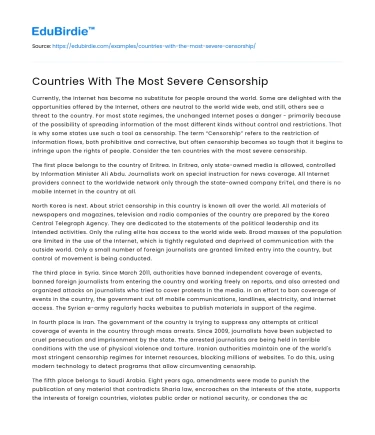Currently, the Internet has become no substitute for people around the world. Some are delighted with the opportunities offered by the Internet, others are neutral to the world wide web, and still, others see a threat to the country. For most state regimes, the unchanged Internet poses a danger - primarily because of the possibility of spreading information of the most different kinds without control and restrictions. That is why some states use such a tool as censorship. The term “Censorship” refers to the restriction of information flows, both prohibitive and corrective, but often censorship becomes so tough that it begins to infringe upon the rights of people. Consider the ten countries with the most severe censorship.
The first place belongs to the country of Eritrea. In Eritrea, only state-owned media is allowed, controlled by Information Minister Ali Abdu. Journalists work on special instruction for news coverage. All Internet providers connect to the worldwide network only through the state-owned company EriTel, and there is no mobile Internet in the country at all.
North Korea is next. About strict censorship in this country is known all over the world. All materials of newspapers and magazines, television and radio companies of the country are prepared by the Korea Central Telegraph Agency. They are dedicated to the statements of the political leadership and its intended activities. Only the ruling elite has access to the world wide web. Broad masses of the population are limited in the use of the Internet, which is tightly regulated and deprived of communication with the outside world. Only a small number of foreign journalists are granted limited entry into the country, but control of movement is being conducted.
The third place in Syria. Since March 2011, authorities have banned independent coverage of events, banned foreign journalists from entering the country and working freely on reports, and also arrested and organized attacks on journalists who tried to cover protests in the media. In an effort to ban coverage of events in the country, the government cut off mobile communications, landlines, electricity, and Internet access. The Syrian e-army regularly hacks websites to publish materials in support of the regime.
In fourth place is Iran. The government of the country is trying to suppress any attempts at critical coverage of events in the country through mass arrests. Since 2009, journalists have been subjected to cruel persecution and imprisonment by the state. The arrested journalists are being held in terrible conditions with the use of physical violence and torture. Iranian authorities maintain one of the world's most stringent censorship regimes for Internet resources, blocking millions of websites. To do this, using modern technology to detect programs that allow circumventing censorship.
The fifth place belongs to Saudi Arabia. Eight years ago, amendments were made to punish the publication of any material that contradicts Sharia law, encroaches on the interests of the state, supports the interests of foreign countries, violates public order or national security, or condones the activities of criminal elements. There is a special Communication and Information Technology Commission in the country. Any citizen of the country can send a personal request to block a resource that, in his opinion, violates the law. Every day, the commission receives about one thousand two hundred such applications, about half of which are satisfied.
Sixth place in Ethiopia. There are no independent TV and radio stations, the only state-owned Internet provider has full control over public access to the Internet. Unwanted government sites are blocked regularly without any litigation and rulings. International journalists who work in the country are under the close supervision of special services.
Azerbaijan is in seventh place. In one thousand and twelve years of the year, the National Council on Television and Radio Broadcasting imposed a ban on the broadcasting of foreign serials on Azerbaijani television channels. Other industries such as the media, print media, and, of course, the Internet, are also censored. And this is despite the fact that the country's constitution guarantees freedom of speech.
Also in this list got Vietnam. He is in eighth place. Citizens of the country are allowed to have access to world sites like Yahoo and Google, but on the condition that the authorities should be aware of the names of all the bloggers who use these sites. Any information that criticizes the government or communism is immediately blocked. The same thing happens with sites that try to write about civil rights and human freedoms.
China is in ninth place. The main objects of censorship are political topics related to the events on Tiananmen Square in 1989 or with movements for national independence in Tibet. In addition, in China, any erotica and pornography are prohibited. In the field of the Internet, China is one of the main sensors in the world. The country has developed a system called 'Golden Shield', this system filters web pages for keywords related to state security.
The last tenth place belongs to Myanmar. Despite the formal abolition of censorship in the two thousand and twentieth year, government control over the media in the country remains. On the Internet, censorship is no less strong. E-mail and any personal correspondence are always filtered and checked by the special services. Internet cafes keep a complete record of visitors, and anonymous services like VPNs are completely prohibited.
In all of these countries, pervasive filtering is in place. This powerful filtering performs state orders. Internet police start to act from the moment you enter text into the search box. Create your own network action logs. Violation of the law entails criminal liability. It is difficult to say whether censorship is worth protecting the public interest or prohibiting civil liberties. Each country, under the pretext of protecting its traditions, creates laws affecting Internet resources. Civil society forms organizations that advocate for freedom of access to information. Confrontation for the independence of the Internet is growing every year more and more.






 Stuck on your essay?
Stuck on your essay?

